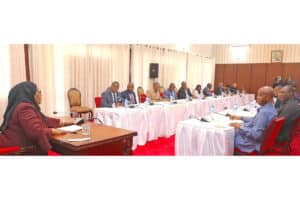Tanzanians go to the polls this year in local elections to vote for street and village chairpersons. This will be followed by a general election next year for councillors, members of parliament and the president.
Both sets of elections are being watched closely. They’re the first to be held following a raft of changes over the past eight years to drag Tanzania away from its history of operating as a one-party state and towards a more multiparty arrangement.
This history has included restrictions on opposition parties’ activities. For example, between 2016 and 2023, political rallies were banned in Tanzania. This was a huge setback given that rallies are the core campaigning and mobilising tool used by opposition political parties.
A single-party system was introduced in Tanzania in 1965. The 1977 merger of the ruling parties in the Tanzania mainland (Tanganyika African National Union) and Zanzibar (Afro-Shirazi Party) to form Chama cha Mapinduzi further entrenched the one-party state. That same year, a constitution was passed that organised Tanzania’s legal structures within a one-party system.
In 1992, the country allowed a multiparty system. This was in keeping with shifting trends across the continent and a response to calls from within and outside Tanzania for multipartyism. However, the constitution remained largely the same, with only superficial amendments. For example, electoral commissioners remain presidential appointees. The president is also the chair of the ruling party.
In 2016, the late president John Magufuli restricted the operations of opposition political parties. In 2019, a new Political Parties Act was passed to further contain opposition parties by giving the registrar wide powers to deregister parties, suspend individual members from parties and demand any information from a party.
Magufuli died in March 2021. When Samia Hassan took over as president shortly afterwards, she expressed a desire to expand the democratic space. She held dialogues with opposition leaders who raised key issues, including calls for constitutional reform. They also wanted an independent electoral commission, reforms in electoral laws and systems to allow more proportional representation, and freedom to carry out political party operations such as public rallies.
In January 2023, Hassan lifted the six-year ban on opposition-led public rallies. New electoral law amendments were also passed in March 2024. These included the Independent Electoral Commission Law and Political Parties Affairs Act. The amendments are supposed to improve fairness in the electoral process.
I have researched opposition parties in Tanzania, and analysed their efforts to survive and mobilise support. In my view, Hassan has not made a substantial difference. The reformed laws don’t bring real structural change.
While the space for campaigning and mobilising towards the 2024 and 2025 elections has widened in comparison to the period before the 2019 and 2020 elections, it still isn’t enough to facilitate free and fair elections. Opposition parties must continue to press for and demand real reforms.
State of the opposition
Over 30 years of multiparty politics in Tanzania, the sustainability of opposition parties has been questionable. Since the 1995 general elections, which were the first since the re-introduction of a multiparty system, the vote share for opposition parties has been irregular.
Different parties have dominated in opposition. In 1995, NCCR-Mageuzi was the leading opposition party with a 21.8% vote share. In the 2000 and 2005 elections, the Civic United Front was the main opposition party with a 16.2% and 11.6% vote share, respectively. From 2010 to date, Chadema has been the dominant opposition party with a 40% vote share in the 2015 election.
The 2020 elections returned Tanzania to a de facto one party state. Chadema won 13% of the vote amid claims of electoral irregularities. Parliament became a one-party house with 99% of all members being from the ruling party.
Reforms or a performance of reforms?
An analysis of the changes Hassan has passed since she came to power in 2021 doesn’t show significant change in terms of structural reforms.
For example, members of the electoral commission are still appointed by the president. Elections returning officers at district levels are also presidential appointees. The registrar of political parties remains powerful and can interfere in political parties’ affairs.
This political context hasn’t been friendly for the establishment of strong opposition parties. Although there are 19 fully registered political parties in Tanzania, only a few are strong. These are the ruling Chama cha Mapinduzi, and the opposition parties Chadema and ACT-Wazalendo.
ACT-Wazalendo was the last party to be registered in Tanzania – 10 years ago. Since then, no new political party has been registered, and those that have tried have found it difficult to get through the process.
The party registration process has two stages: provisional and full registration. Each has a set of requirements that the registrar scrutinises to determine approval. This provides room for delays.
However, the overall demand for new political parties is not high in Tanzania. This could be due to factors such as:
- a lack of incentive to register a political party given the unfair political ground for opposition parties
- the bureaucratic process to register a new party
- limited ideological drive and uncertainty of public support due to developed political apathy – for instance, small opposition parties have supported the ruling party and worked against the main opposition party.
What still needs to change
There is a need for a change in political culture among ordinary citizens as well as the political class, including civil servants. The current political culture is submissive to the ruling party as a result of the entrenched party-state system. Due to this political culture, most citizens are not driven to question the system and demand change.
The call and demand for real reforms can only work when a majority of citizens support calls for new electoral laws and constitutional reforms. Otherwise, the ruling party has a false sense of confidence. Opposition parties and activists need to embark on systematic and aggressive civic education. Citizens need to believe in their civil right to demand change.
Aikande Clement Kwayu, Independent researcher & Lecturer, Tumaini University Makumira
Source: allafrica.com














